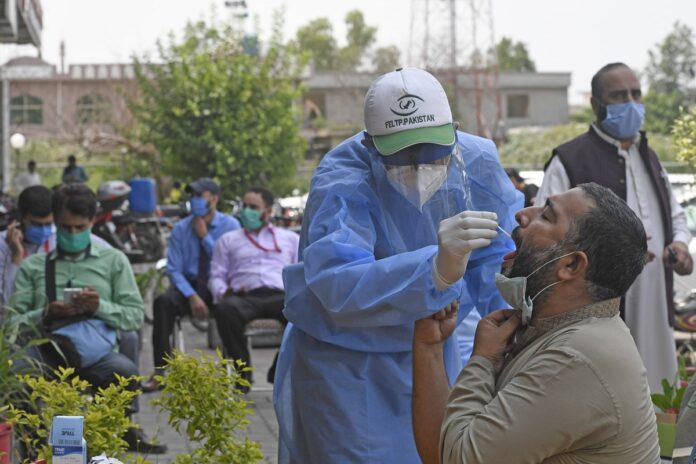ISLAMABAD: Deputy Chairman Planning Commission (DCPC) Muhammad Jahanzeb Khan on Wednesday chaired what was the third high-level interprovincial meeting at the Planning Commission in less than two weeks to discuss Covid-19 national plan.
In his opening remarks, the DCPC informed that the Rs70 billion funding, which would be provided under the Public Sector Development Programme 2020-21, would support the provinces in executing four priority initiatives namely ‘National Health Upgradation Plan’, ‘Strengthening the Public Health Disease Surveillance and Response Systems’, ‘National Programme for Water Sanitation and Hygiene’ and ‘National Programme for Creating Livelihoods’.
The DCPC emphasised the importance of a credible network of labs, establishment of quarantine facilities at entry points and having electronic medical record systems.
“We must realize that the storm is still hovering around and there is a need to be mindful of the ever-mutating nature of viral infections and be prepared before the next wave,” he stated. “The government has prioritized investment in critical care and infectious disease management at the tehsil and district headquarter hospitals, as we know that we cannot go wrong with that.”
Social Sector Member Dr Shabnum Sarfraz in her presentation said that the Covid-19 pandemic has proven to be a deadly reminder of the gaps in healthcare systems’ capacity globally, underscoring the need for significant investment of resources to strengthen the healthcare infrastructure and build system resilience to weather public health shocks.
“Now 146 days into the pandemic, Pakistan is witnessing a decline in daily cases, along with decreasing positivity rates,” she noted, lauding the exhaustive efforts of the provinces.
She said that while Pakistan has been spared from the disastrous morbidity burden and death toll related to Covid-19, the likes of which have been seen in US, UK, Italy, Brazil and now India, “we continue to teeter on the edge of disaster”.
“As there is an urgent need to strengthen the public health infrastructure for building our resilience for future, it is equally important for Pakistan to optimize the THQs and DHQs for critical care and infectious disease management.”
Speaking on the occasion, IDAP CEO Mujahid Sherdil shared the details of completed and ongoing projects and also provided comprehensive information on establishing High Dependency Units (HDU) in the hospitals across Pakistan.
The forum deliberated and developed consensus around the four priority national initiatives for which dedicated funds of Rs70 billion have been earmarked in PSDP 2020-21.
Federal health secretary Amer Ashraf Khawaja, while appreciating the initiative, informed that in his recent meeting with the provinces, the initiative was welcomed by all. He said that the funds would not only address the current situation but would also build the country’s resilience.
He informed that the cabinet had recently approved the NIH Act 2020 which would support the Covid-19 response and preparedness interventions.
Meanwhile, the Climate Change secretary emphasized that WASH was indeed a critical domain with its vital contribution towards the promotive and preventive aspects of the continuum of care. She said that the provinces need to identify what priority investments they need, and the Ministry of Climate Change will be happy to offer coordination.
She suggested that the provinces may consider focusing on the densely populated areas for this intervention.




